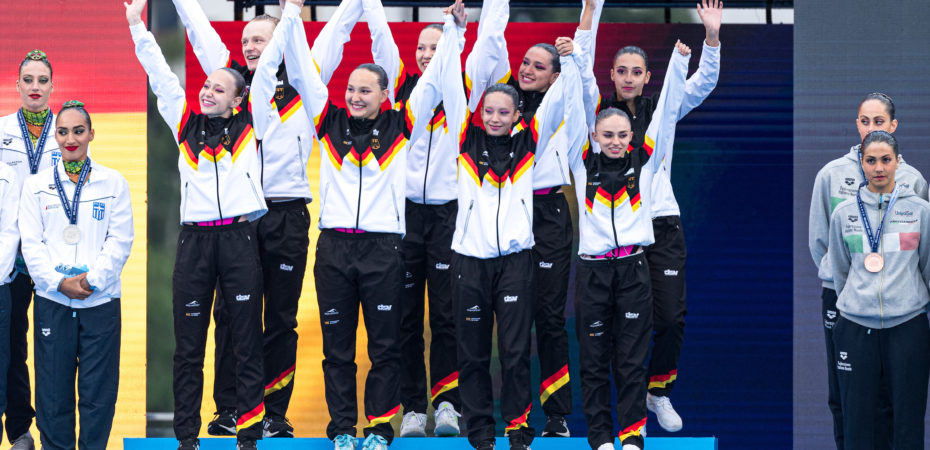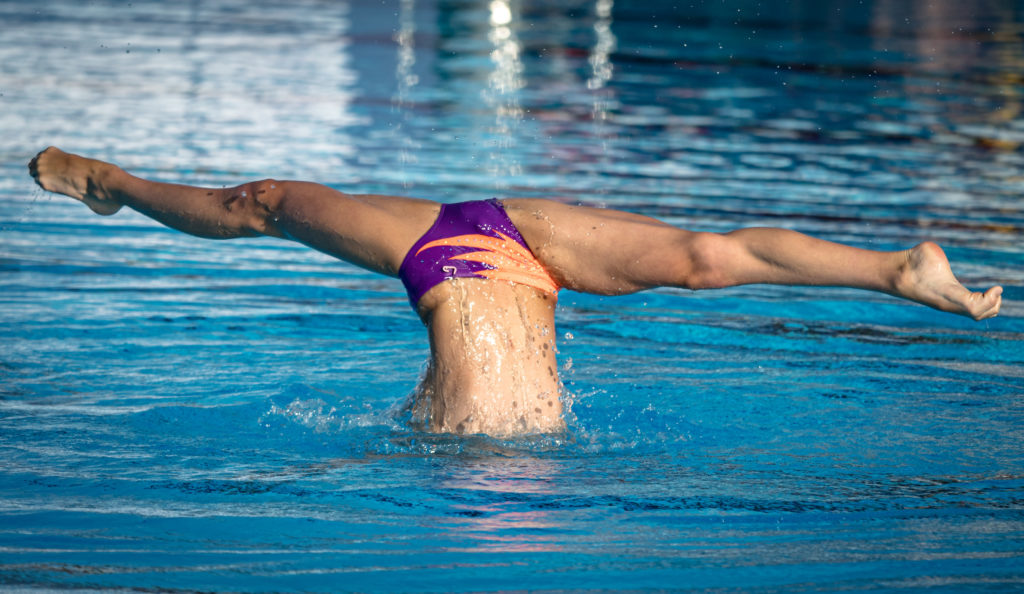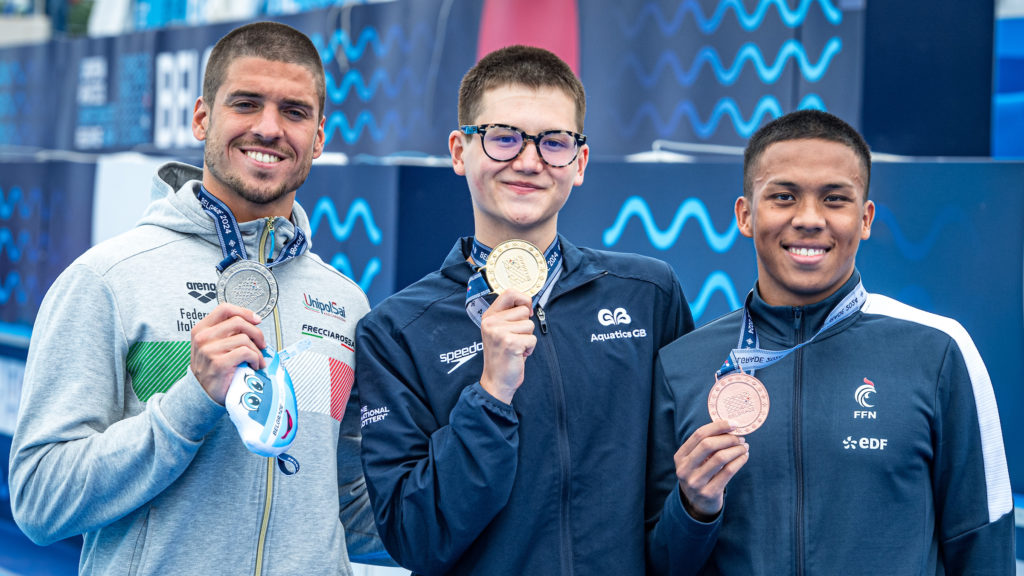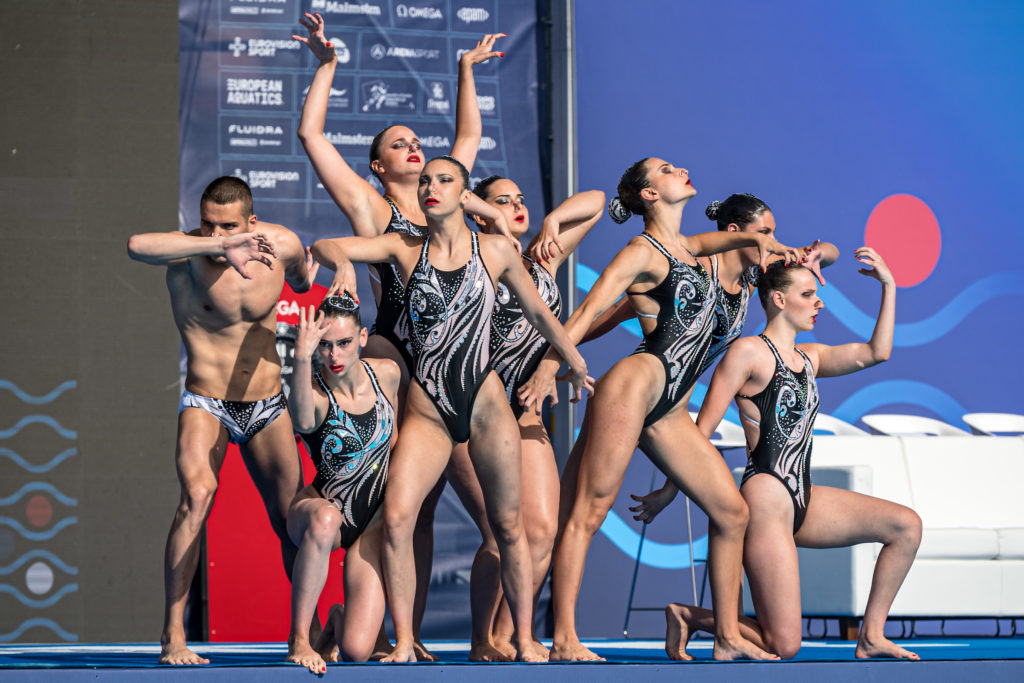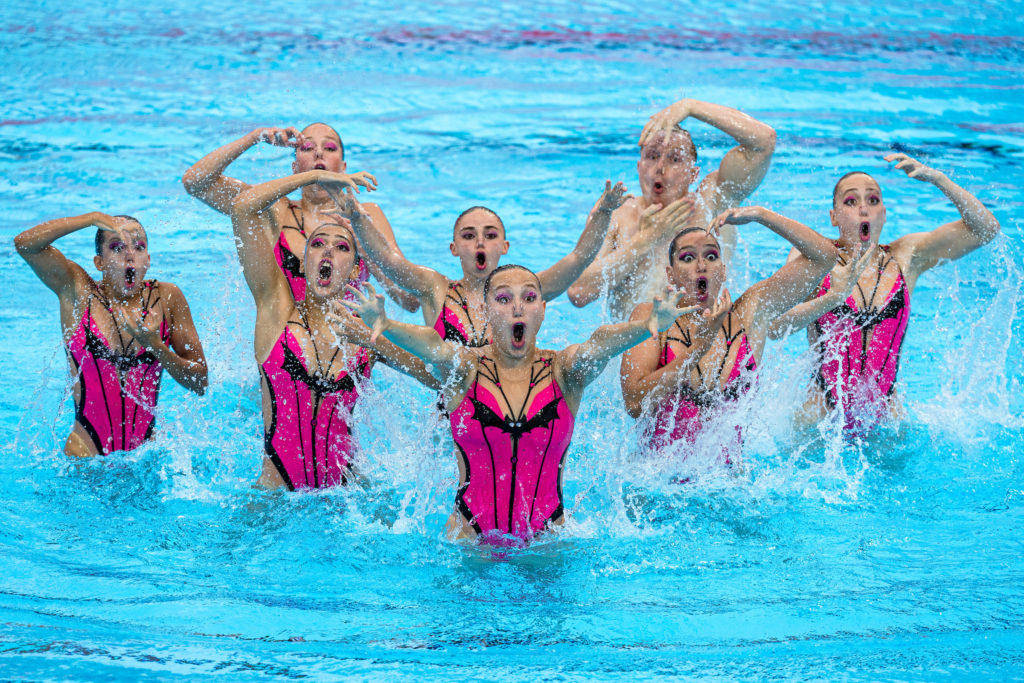The artistic swimming competition at the 2024 European Championships in Belgrade was always bound to be an interesting and exciting one. The vast majority of the current title holders hadn’t traveled to Belgrade, either focusing on the Olympic Games, the upcoming junior competitions, or simply on different events.
Consequently, Belgrade was the stage of landmark victories. Austria, Spain, and the Netherlands each secured multiple golds, highlighting their dominance in their respective events. Great Britain and Italy each brought home seven medals in total, while Germany and Greece made history with first-ever European gold medals.
Women Solo
The two podiums for the women’s solo events looked quite familiar already. The same three athletes from Austria, Germany and the Netherlands had already medalled together at the Paris World Cup in May.
In the technical event, Vasiliki Alexandri of Austria claimed her first European title with her “Road to Success” routine, scoring 260.5967. This victory marked a significant milestone for Alexandri, as she became the first Austrian to win a European gold in the solo event.
A few days later, she continued her dominance in the free solo final, clinching her second gold of the championships with a score of 257.4959 for her “Fight for Survival” routine. Despite not feeling her best on that day of the competition and having to deal with the absence of her sisters, Alexandri managed to deliver a stellar performance, completing her season as a two-time European champion.
“One of the goals that I had in my sports career came true,” she said. “I am very happy and relieved, especially after Doha (World Championships). It is still something I really feel on my shoulders. It was also really difficult mentally to not have my sisters here with me, and I’m a little bit sad that they are not here so we can celebrate together. But immediately, I called them on the phone, and also our mother is here in the stands so I can share this special moment with her.”
Klara Bleyer of Germany secured two silver medals with scores of 242.9617 in technical solo and 253.4772 in free solo. This achievement was a historic one for unified Germany, as the last solo medal for the nation was won by Gudrun Hänisch in 1983, who represented West Germany.
“A few years ago, if someone had told me this, I’d have been like, ‘are you kidding me?’,” she said. “Being on a podium at a European Championships is just amazing. I know it’s an Olympic year and not every country is here, but for Germany, it is a very big deal. I hope that I can show my country that it’s possible, and that artistic swimming will get more in the public eye that way.”
Marloes Steenbeek of the Netherlands rounded out the podiums with two bronze medals. Steenbeek’s performance marked the first solo medals for the Netherlands in 43 years, a significant accomplishment for the 19-year-old who only started competing in this event internationally this year. Her season is far from over, as she will compete next in the European Junior Championships, the World Cup Super Final, and the World Junior Championships.
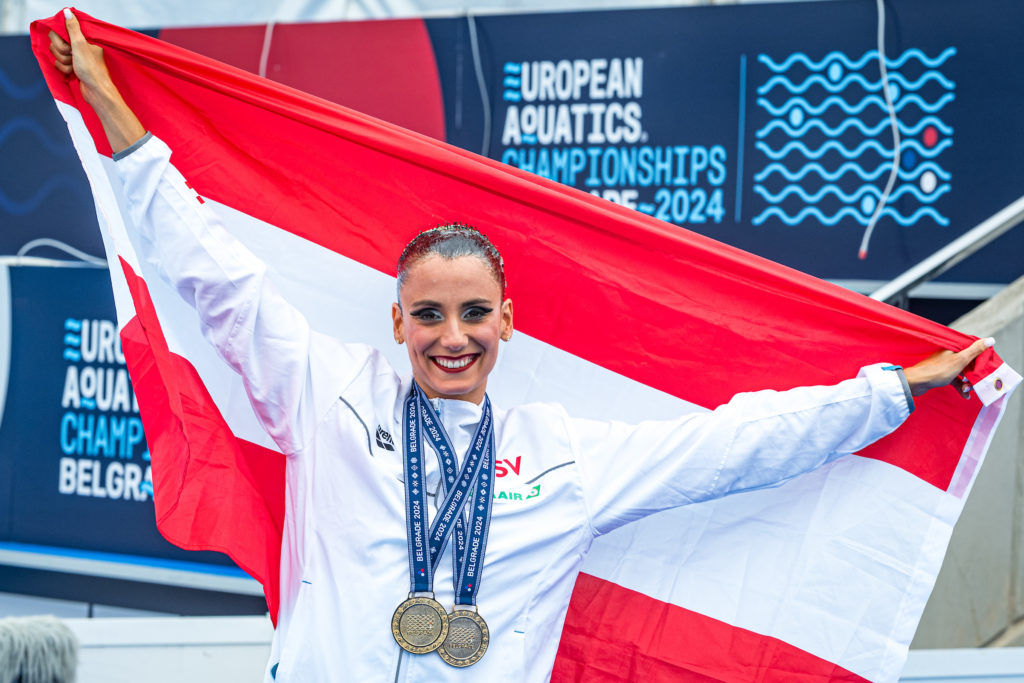
Men Solo
Dennis Gonzalez Boneu of Spain won gold in the technical solo with a score of 225.8466 for his routine set to “Kiss” by Prince. This victory was particularly sweet for Gonzalez Boneu, who had to overcome injuries and missed training time earlier in the season.
“I dreamed of this,” he said. “Also because I was fourth in the last World Championships. The best male artistic swimmers are in Europe, so I knew I had to do better and be at my best here to win. I fought for a long time for this. At the Doha World Championships, I had some pains in my arms and I couldn’t do my best difficulty or really enjoy the routine. I had surgery after that competition, and the World Cup in Markham was my first competition since. We go step by step, so I was very happy and proud when I saw that I did it, I won the gold.”
In the free solo, Ranjuo Tomblin of Great Britain made history by winning his first European title, and the country’s first European gold in 39 years with a score of 191.0293. Performing to “Natural” by Imagine Dragons, Tomblin’s routine emphasized resilience and strength, reflecting his journey overcoming a back injury that took him out of the pool at the beginning of the year.
“Seeing European champion next to my name, I can’t even believe it,” he said. “I don’t think I will ever recover from this. I just came into this competition wanting to swim my best and with no basemarks, and to be able to do this… When I saw the “1” next to my name, I couldn’t even process it. I remember hugging my coaches Paola (Basso) and Stefania (Speroni), them saying that I did it… Then I remember walking out and just collapsing on the floor because I couldn’t even believe it, my body just filled with emotions.”
Tomblin also secured silver in the technical solo with his “Greatest Show” routine, scoring 204.4466.
Giorgio Minisini of Italy, two-time European Champion in 2022, had to settle for silver in the free solo and bronze in the technical event. Both of Minisini’s routines, set to “Hallelujah” by Andrea Bocelli and to “Still loving you” by Scorpions, respectively, were marked by high artistic impression, but also by basemarks which impacted his final score.
Quentin Rakotomalala of France secured his second European bronze medal in the free solo with a score of 174.4708 for his “Cyborg” themed routine and with the highest DD of the field, 34.35.
Women Duet
Much like in the women’s solo, the women’s duet podiums repeated themselves in Belgrade.
Bregje and Noortje de Brouwer of the Netherlands became two-time European Champions in the duet, swimming their “Disco” choreography in the technical duet, and their “Van Gogh” routine in the free event. This victory marked the first duet gold for the Netherlands in nearly 50 years. Their ability to deliver a top performance despite limited training time due to Noortje’s recent type 1 diabetes diagnosis was remarkable.
“I think somebody has to wake me up, because I don’t believe this yet,” Noortje said. “We are really European champions, twice! It has been only about seven weeks since I got the diagnosis. In the beginning, there were some adjustments to make, because I didn’t train much and I lost some muscles. We weren’t sure if we even had enough time to be in Belgrade. After some weeks, we saw I was doing okay and we decided we could come, but we were planning to do only the free duet. But then after our training camp in Torremolinos, our coach (Esther Jauma) told us we were ready for both. We can be very proud.”
Kate Shortman and Isabelle Thorpe of Great Britain claimed two silver medals, notably showcasing their “Rising Phoenix” free choreography for the first time since the Doha World Championships. The pair’s increased DD, superior variety in the hybrids performed, and seamless execution showcased their readiness for the upcoming Olympics.
“It’s quite bittersweet because obviously we were fighting for the gold,” Shortman said after the technical final. “But I guess it’s a privilege to even be fighting for that top place position, so we’re happy about that, and very happy with the swim. There’s still a lot of room for improvement going into Paris, so we’re really excited for this last push.”
Shelly Bobritsky and Ariel Nasse of Israel took home two bronze medals, the country’s first European medals in duet. In the free final, they scored 245.6105 for their “New World” routine, and had really stepped it up in terms of DD in a short timespan – they had declared 45.05 in the Markham World Cup at the beginning of the month, and achieved 48.50 in Belgrade. The two do plan to unveil a new free duet routine for the Olympic Games.
Their high DD and clean performance also helped them to a second bronze a few days later in the technical event with their “Gypsy Dance” routine.
Sofia Malkogeorgou and Evangelia Platanioti of Greece, also preparing for the Olympics, unveiled their new technical routine. Swimming to the theme of “Hellenic Spirit”, the two had declared a massive 39.15, which would have been the highest done so far in an international competition. Unfortunately, they received a basemark on their final hybrid and had to settle for fifth place in Belgrade.
Finally, Maria Goncalvez and Cheila Vieira of Portugal wrapped up their season on a high note with an outstanding fourth-place finish in the technical duet for their “Rodeo” routine.
Mixed Duet
Spain‘s mixed duet of Dennis Gonzalez Boneu and Emma Garcia claimed gold in the free event with their “Hip Hop” routine, scoring 189.7938. This marked Garcia’s first European title, a significant milestone in her career after years of silver medals.
“I am so excited, proud, and really happy for my duet partner as well,” she said. “It took a lot of years for me to have this gold and this title, finally I could achieve it. I just thought about my grandpa who’s in the sky and who is always with me. This medal is for him.”
Gonzalez Boneu paired up with Mireia Hernandez to showcase a “Congo” routine in the technical event. The two narrowly secured the top spot ahead of Italy by only 1.6025, despite receiving a small deduction for their pair acrobatics. Of note, Gonzalez Boneu contributed to three of the four golds for Spain in Belgrade.
Much like the Spaniards, Italy’s Filippo Pelati had different partners for the free and technical event. In the former, he and Flaminia Vernice won silver with a score of 188.6250 for their “Orpheus and Eurydice” routine. A few days later, he swam alongside Sarah Maria Rizea to claim another silver in a “Renaissance” choreography.
Both of Vernice and Rizea’s performance are quite noteworthy as they headed into the mixed duet competition essentially less than an hour after swimming in the women’s duet.
Finally, Great Britain‘s Beatrice Crass and Ranjuo Tomblin took two bronze medals in the mixed duet events, with their “Black Panther” free routine scoring 175.1563, and their “Modern Charleston” technical routine with a score of 202.9817. The pair came in as the current European bronze medallists and successfully managed to repeat thanks to their clean execution without basemarks.
“This just tops it off,” Tomblin said. “I’ve said it before, but we didn’t come here really expecting anything. We just wanted to swim our best, so to be able to get another medal is a testament to our hard work and our sacrifices through the hard times this year.”
Tomblin leaves Belgrade with a full set of medals, and four in total. He will compete next at the European Junior Championships in Malta.
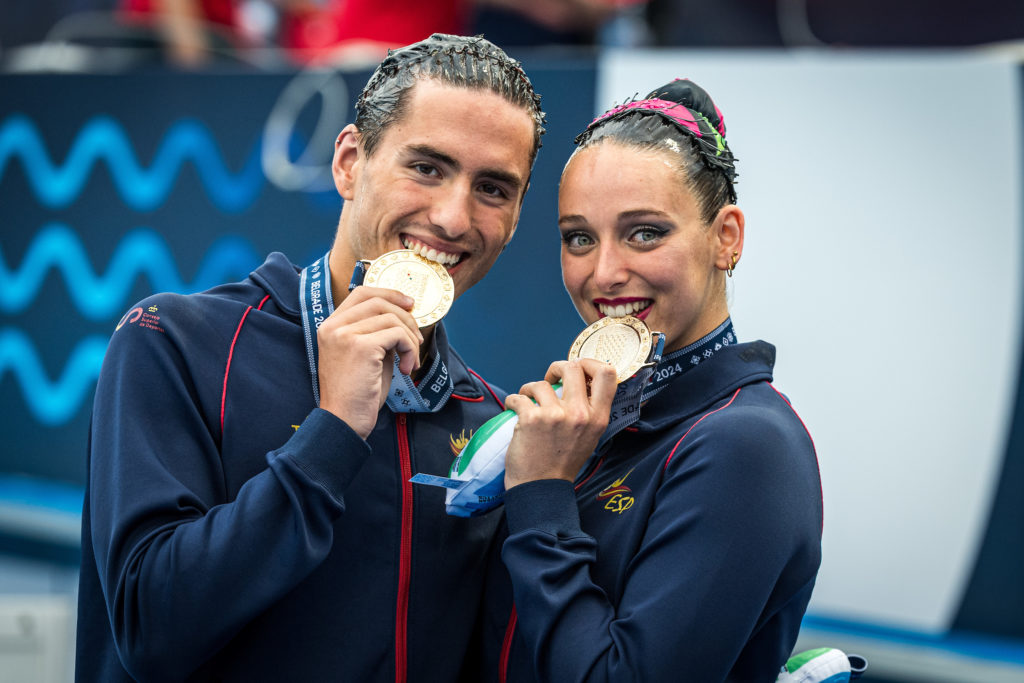
Teams
Spain won the first gold of the championships in the technical team with their “Ponle fuego ¡VAMOS!” routine, scoring 278.4684. Their performance to “Mambo” from West Side Story was fast-paced and engaging, solidifying their status as back-to-back European champions and reigning vice-World Champion.
The roster of this Spanish team was nonetheless slightly different from what we’ve seen previously, with the notable absence of Tokyo Olympian and team veteran Paula Ramirez, and the just-as-experienced Sara Saldana serving as reserve. Qualified for the 2024 Paris Games, Spain has opted to only compete in the technical team event in Belgrade amongst the five Olympic events. The Olympic Team has yet to be announced as well.
The team of Greece claimed its first European gold medal in the free event with a score of 270.1980. In the preliminaries, the squad had actually declared a DD of 55.20, marking a 10.05 increase since Doha, but received five basemarks.
After making adjustments to their DD and team roster for the final, the Greek delivered a much-improved performance with their “Warriors” routine and secured the top spot. This historic victory was marked by emotional celebrations and a sense of immense pride among the athletes.
“For the last two days, I’ve been telling you that we wanted to win the gold medal, and finally, we did it,” Athina Kamarinopoulou said. “It’s a really touching and unique moment for an athlete to hear their national anthem on the podium, with a gold medal on their chest. But it’s not just a medal. Behind it are many, many hours of practice, a team with a lot of will and that knew they could do it.”
Greece leaves Belgrade with three medals in total, after also claiming silver in the technical and acrobatic team events. Most of the athletes on this squad are still juniors, and will compete next at the European Junior Championships in Malta and the World Junior Championships in Peru.
In the acrobatic team event, Germany made history by winning its first European Championships gold in artistic swimming with a score of 192.7166 for its brilliantly-crafted “Addams Family” routine. The nation was also the only mixed team in the final as it included history-making Frithjof Seidel, who in 2023 helped the squad win its first European team medal in 40 years.
“I feel relieved,” Seidel said. “When we left the pool, we didn’t know what the result would be. We knew that Italy had a really strong degree of difficulty and we saw their acrobatics during training, they’ve got an incredible flier. But obviously, we’ve got two incredible fliers as well. I’m really proud of us and all the girls. I think I still need a few more minutes, maybe days, to process all these emotions.”
Adding to the two silvers of Klara Bleyer, this gold and European Championship title will undoubtedly help the country moving forward.
“We are super happy about the results of the European Championships,” coach Stephanie Marx said. “Winning the acrobatic was the cherry on top. It means a lot because it is also an Olympic discipline and we continue to show progress, which will help us get more funding and support, to really develop to the next stages. I also hope that we showcased that men have a place in teams. I am personally very sad that we will not see that yet in the Olympics, I think there are many good reasons for that. But hopefully, we proved that when you are smart and use different skills of the athletes, you can do amazing things.”
Italy performed strongly in the three team events, winning one silver in the technical team and bronze in the free and acrobatic event. Although the country is qualified for the Olympic Games, this is not the Italian team that will compete in Paris.
Most of the athletes on this roster actually made their senior European Championships debuts on Monday, clearly demonstrating the strength and depth of talent that the Mediterranean nation boasts.
The Italian squad also notably included Marta Murru, who successfully returned to elite artistic swimming after giving birth to her daughter last November. She performed in all three team routines.
“It was a very nice competition,” she said. “Above all, it was a goal that I wanted to reach to give an example that being a mother doesn’t just mean being a mother, you can also be a mother-athlete. Competing with this team was truly a fantastic emotion, they integrated me very well into the team. I am very happy with what we achieved.”
Italy was entered in all 11 events in these European Championships and won a medal in seven of them.
Great Britain won the bronze in the free team final with a score of 219.0228, performing to the theme “Female Warriors.” Their great swim, with only one basemark, earned the British squad their first team medal since 1985, signaling a promising future for the nation’s artistic swimming. Similarly, Team GB leaves Belgrade with seven medals, including one gold.
The technical team final also marked a historical moment for the home squad, with the country competing in a team event for only the second time at a European Championships. Serbia was also the sole mixed team in that final, as 2022 bronze technical solo medallist Ivan Martinovic took part in the routine.
“It was brutal for me to train with a team,” said Martinovic, laughing. “It was very hard, but the girls were amazing and made it a very fun experience. It was so great to have everyone here today, our friends, families, and even grandparents who never saw us doing synchro before, even on TV. They watched us live and it gave us that little boost that we needed for this to be an amazing experience.
“It’s always a pioneer moment when I do anything in this sport, because there is a patriarchy in Serbian culture so it’s very unlikely to see a male in a female-dominated sport. I think I’m breaking boundaries; maybe some young kid in the stands might now be okay to try synchronized swimming after seeing me.”
Looking ahead, many athletes who competed in Belgrade will carry their momentum into the European Junior Championships in Malta, and obviously to the Olympic Games in Paris.
ARTICLE BY CHRISTINA MARMET
Cover photo: Pasquale Mesiano / Deepbluemedia
If you’ve enjoyed our coverage, please consider donating to Inside Synchro! Any amount helps us run the site and travel costs to cover meets during the season.

